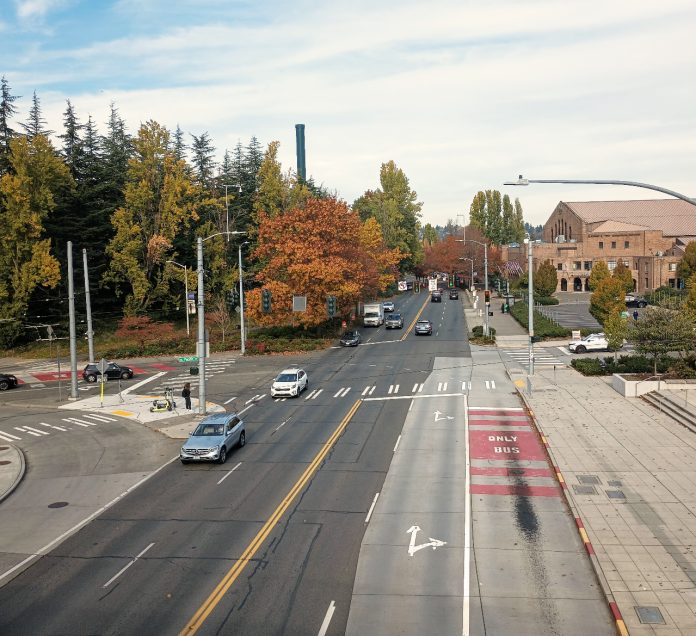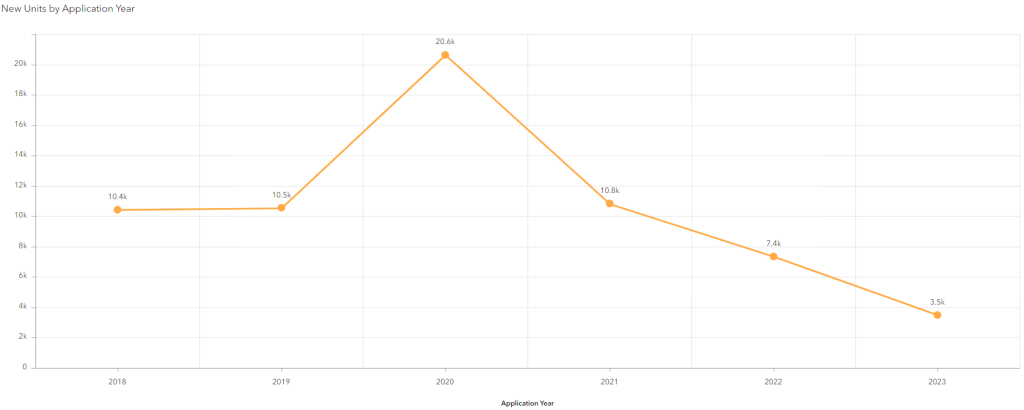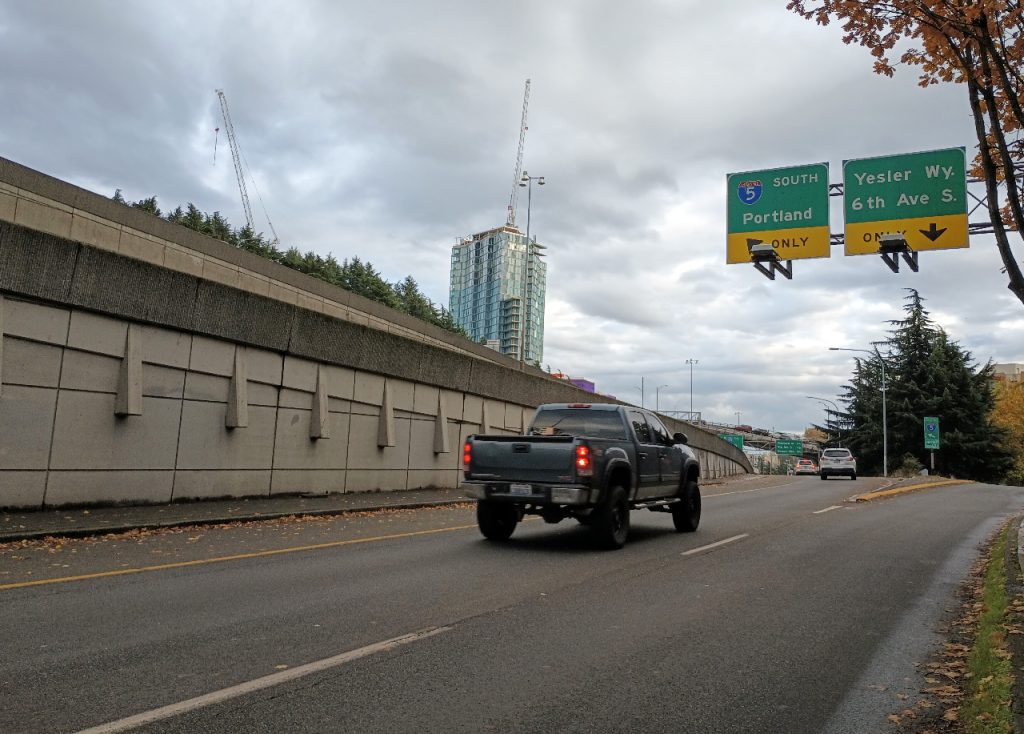
The Seattle City Council is set to take a major step toward implementing a transportation impact fee program, following a public hearing on the idea Tuesday and a favorable ruling at the City’s Hearing Examiner earlier this week. Impact fees, which are levied on new housing and commercial development in order to directly fund specific transportation projects, are authorized under Washington’s 1990 Growth Management Act but aren’t currently imposed in Seattle.
With several long-time proponents of the idea of impact fees leaving the council, including Kshama Sawant, Lisa Herbold, and Alex Pedersen, there is an impetus to set things up for a future council to more easily be able to implement these types of fees, even if a final vote to directly impose them would have to come sometime in the future. Over the last several years, the ability to take this vote has been tied up in appeals over the City’s process to get to this point.
Impact fee opponents, including those who filed that appeal, argue that they amount to a tax on badly needed new housing, and that adding another fee onto the ones that already exist in the City will cause many projects to lose their financing and not “pencil out” as buildable. They argue that council should consider the broader impact of this decision on the City’s housing goals.
At Tuesday’s hearing, homebuilders both both the private and nonprofit sector cited significant costs that are already impeding projects. Several developers made the point that if the council incorporates an impact fee rate structure and project list within the Comprehensive Plan now, that would immediately impact the financing of housing projects that are entering the pipeline as those added costs begin to be included in underwriting for construction loans. With the drag of high interest rates, housing applications are trending downward in Seattle.

“If this Comp Plan amendment is approved, regardless of the timeline for actual code implementation, the development community, including ourselves, will have to include these fees from the rate study in our underwriting, and disclose these fees to our lenders and investors,” Meredith Holzemer, the Managing Director of Development for Mill Creek Residential, told the council, noting that impact fees would be set to be collected around two years after a project started going through the permit process.
Some transportation advocacy organizations, including the Seattle Transit Rider’s Union and the Disability Mobility Initiative have voiced support for studying impact fees as an ongoing source of transportation revenue, but others (including The Urbanist editorial board) have raised concerns about this specific proposal and the project list that the council is currently considering, which is mostly a placeholder left over from the last time the council took a substantive run at impact fees in 2018.
“The list of proposed projects that a transportation impact fee could fund is outdated and geared much too heavily toward projects that would increase traffic capacity,” Robert Cruickshank, chair of Sierra Club Seattle group, wrote in a letter to Council dated this week. “The list is not aligned with the City’s emerging transportation plan, and it appears to directly undermine our climate goals by promoting rather than reducing single occupancy vehicle trips.”

The day before the hearing, the most recent appeal of the council’s impact fee proposal was tossed out by Ryan Vancil, the City’s hearing examiner, opening up the door to this council action. A previous public hearing had been scheduled earlier this fall but was cancelled when it became clear that the ruling would not yet be released. Vancil’s ruling helps councilmembers like Herbold who argue that updating this language inside the Comprehensive Plan is a procedural step that doesn’t bound the future Council to do anything.
“The Comprehensive Plan amendments in the Proposal lack sufficient detail to identify the environmental impacts that may be associated with a subsequent implementing program,” Vancil wrote. “The proposed Comprehensive Plan amendments do not ensure the adoption of a TIF program, and does not establish important elements of such a program, such as fee amounts and potential exemptions. In addition, the environmental impacts of development projects that may be funded by a [transportation impact fee] program are merely speculative at this time, because funding for those projects is not provided for by the Proposal.”
But another faction of the Seattle City Council argues that this would be a substantive policy step, and that the council hasn’t had enough time to get its questions answered. Only one discussion of the proposal was held in the council’s land use committee earlier this fall, and at the time a laundry list of questions was raised, answers to which haven’t been made public yet.
“To say that there’s been a conversation on this topic for years, or to dismiss concerns by saying that the last committee meeting was in the spring, is just not good enough,” Councilmember Teresa Mosqueda said. “My questions have not been answered in full and the concerns that I have are not alleviated.” Mosqueda voiced additional concerns that the council was moving this during the time when it’s normally fully focused on the annual budget process.
“I want to reiterate my concern around the pace and the timing of this substantive policy, and the serious impacts that I think it has on our ability to create the needed housing to alleviate the housing crisis on impacted communities,” Mosqueda said. She was joined by Councilmember Dan Strauss, who has largely avoided taking a position on the issue while the appeal was active at the hearing examiner.
“I am not against impact fees. I am not okay with how this is going down right now,” Strauss said.
Councilmember Lisa Herbold, arguing that the time for full “Seattle Process” will come later on, has asserted that the council needs to move forward with this potential revenue source and that the data showing an impact on housing production is inconclusive.
“The City of Seattle has been trying hard to identify new revenue in anticipation of a 2024 revenue gap,” Herbold wrote in a email to constituents this week. “Those most benefiting financially from growth shouldn’t stop civic stakeholders from having this necessary policy discussion that we have repeatedly voted to make commitments to consider.”
But given the fact that any future project list would likely be updated by a future council as part of a full outreach process, it’s not clear why exactly the urgency exists to get this done now.
Early returns from Tuesday’s general election suggest that supporters of transportation impact fees, including District 1’s Rob Saka and District 5’s Cathy Moore, are poised to prevail in their races. What’s less clear is whether Mayor Bruce Harrell supports the idea of moving forward with impact fees right now as his administration looks to craft the next iteration of the City’s transportation levy. A presentation this week to the Move Seattle Levy oversight committee from SDOT finance staff conspicuously didn’t include impact fees as a source of revenue being studied as part of a broader look at the universe of funding options.
The council is set to take a final vote on impact fee legislation on November 21, with Councilmember Debora Juarez as the likely swing vote. Juarez complained Tuesday that the full City Council was turning into a committee meeting to dig into policy questions, but it was Juarez who cast the deciding vote in October to do just that, and has not made her position clear on the actual underlying issue.
The councilmembers who argue that this is a small procedural step are mostly the same people who have long sought to implement impact fees and are attempting to push the future city council before they leave office. But regardless of the vote later this month, the issue of impact fees likely isn’t going away anytime soon.
Ryan Packer has been writing for The Urbanist since 2015, and currently reports full-time as Contributing Editor. Their beats are transportation, land use, public space, traffic safety, and obscure community meetings. Packer has also reported for other regional outlets including BikePortland, Seattle Met, and PubliCola. They live in the Capitol Hill neighborhood of Seattle.

